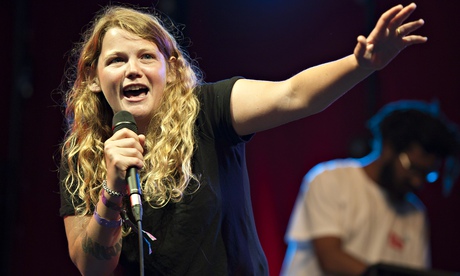
Trying to categorise Kate Tempest is something akin to untangling a basket of eels; her work a slippery, elusive thing. This week alone she has received a Mercury prize nomination for her album Everybody Down, and found herself named as one of 2014's Next Generation Poets by the Poetry Book Society. But then there is the novel. And the play she staged in 2012, as well as her phenomenal reputation as a spoken word poet.
What unites all of these is the 27-year-old Londoner's love of words as playful, pliable, powerful things, as well as her insight into a world and a generation that is often overlooked or ignored.
Tempest grew up in Brockley, south London, working in record shops, living in squats, studying music at the Brit school, in Croydon and, later, poetry at Goldsmiths, University of London.
She caught attention early – performing at open mic nights at both hip hop stores and poetry slams while still a teenager. "I heard her before I read her," says Judith Palmer, director of the Poetry Society. "She was one of the poets that people were always coming back from events and saying 'She's really good.'"
It was the Poetry Society that awarded Tempest the Ted Hughes poetry prize in 2013 for Brand New Ancients, a narrative work that told a tale of everyday heroics, false gods and fierce hopes in modern-day London over tuba, violin, drums, electronics.
When Brand New Ancients was launched at Battersea Arts Centre two years ago, this paper's theatre critic Lyn Gardner spoke of Tempest as "fierce and shy in the same moment … such a genuinely galvanizing presence and acutely responsive to her audience." Palmer points out that the work succeeded even without Tempest's charismatic presence. "The judges heard a recorded version – they didn't see her live," she says. "But they were unanimous that this was something that thrilled them. It was Don Paterson that said this could also work as a book."
Tempest has described herself first and foremost as a rapper, and this was how Billy Bragg encountered her – immediately so struck by her talent that he invited her to appear at the Leftfield stage he runs at Glastonbury, and then to tour as his support. "I was so impressed with her," he says. "I was impressed by the fact she was a white woman doing that, for one thing, and that she had a real sense of vulnerability about her that she was putting across, and a sense of humour. You don't see that in mainstream rap. I've seen her with a band, being loud, and I've seen her drawing an audience in by being quiet. And you don't see that very often in rap either – it's a world where so much is about putting yourself out there. And I suppose she has a poetic sensibility in that way."
Tempest is an example of the way poetry is thriving among younger people, Palmer says, noting that this year's Foyle Young Poets prize, the winner of which will be announced in October, received entries of 26,000 poems from 7,000 poets. "And spoken word poetry is thriving," she adds. "There's a lot of poets trying it, and it's attracting big audiences. It's wonderful when you can see poets that are exciting people, but of course it relies on festivals having the nerve to commission new work."
Tania Harrison is head of arts for Festival Republic, which organises festivals such as Latitude and Reading and Leeds. Harrison first booked Tempest to perform in the poetry tent at Latitude in 2008, and she has appeared at the festival every year since, as well as making her Reading and Leeds debut this year.
"She was a strong voice and is quite unique," Harrison says of first seeing Tempest. "There are page poets and there are live poets and she's very much a live, performance poet. She transcends the page, and once you've seen her perform you're quite mesmerised. She uses such complex language in such a delicate and emotional way."
For Harrison, her appearance at Reading and Leeds, where she was performing to a predominantly young audience, sent an important message – particularly to female audience members: "She shows that to use words and to use yourself is such a strong thing to do."
"I think of Kate as a modern-day Sophocles," Harrison continues. "She has an extraordinary ability to talk about conflicts of power – in her poem Renegade for instance she speaks about not give a fuck about celebrity. It reminds me of Sophocles, who wrote about these very strong women, like Electra, who fight against elitism."
With a new volume of poetry due to be published by Picador next month, and the boost in album sales from the Mercury nomination, Tempest's voice looks to be one we will be hearing for some while to come. "There are lots of things that make her special," Palmer says, "but one of those things is that she produced a really powerful sequence of work, a sustained tour de force. Lots of people can write a good poem, but with her it's the scale of ambition and the determination. That takes a lot. That's dedication."
And her ability to defy categorisation is a strength, Palmer adds. "A good writer can do different things, they can write lots of things," she says. "To me, I don't mind where someone sits. There can be many chairs."

